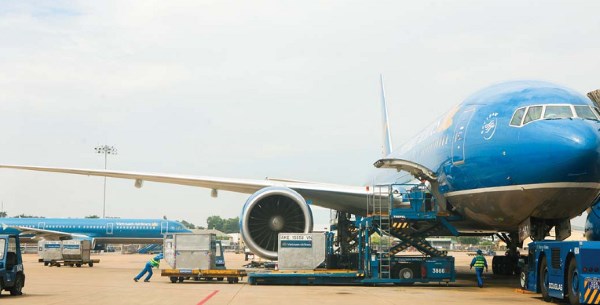ACV prepares for colossal divestment
 |
| The state will divest about 20 per cent of its stake in the country’s largest airport operator next year Photo: Le Toan |
According to Lai Xuan Thanh, chairman of Airports Corporation of Vietnam (ACV), the company submitted its state divestment plan to the Ministry of Transport (MoT) late last month.
Under the proposal, the state will divest 20 per cent of the company’s chartered capital, equal to 435.4 million shares, through a public auction. It is expected to earn around VND39.19 trillion ($1.78 billion), based on the share’s average traded price of around VND90,000 on the unlisted public company market (UPCoM), as of December 5, 2017.
If the deal is successful, the state holdings in ACV would be reduced to 75.4 per cent of the company’s chartered capital.
Currently, the MoT, which represents the state capital owner in ACV, possesses 2.076 billion shares, equal to 95.4 per cent of the company’s chartered capital, whereas other shareholders own more than 100 million shares, equal to 4.6 per cent of ACV’s chartered capital.
In Decision No. 1232/QD-TTg, dated August 17, 2017, the prime minister approved a list of state-owned enterprises to engage in state capital divestment plans from 2017-2020. The state’s shareholding in ACV would accordingly go down by 20 per cent to 75.4 per cent in 2018, before dropping further to 65 per cent by 2020.
“We propose selling ACV shares in public auctions to ensure transparency and state benefits. Based on the market situation, the stake sale will either take place at once or in several instances at the Ho Chi Minh City Stock Exchange (HOSE),” said Thanh.
While declining to disclose the state of their continued negotiations of a stake sale to a strategic shareholder – France’s Groupe ADP (formerly Aéroports de Paris) – the ACV leader certified that ACV’s state capital divestment aims to attract both domestic and foreign investors, and that the company will host extensive road shows at home and abroad to appeal to investors.
Operating officially under the joint stock model since April 2016, after making its initial public offering (IPO) in late 2015, the company now holds a monopoly in managing and operating six international airports and 16 domestic airports, with 65 per cent of its revenue coming from duty-free shops trading.
Before holding this state capital divestment round, ACV is set to move from UPCoM to HOSE in an attempt to boost its stock liquidation.
With a $2 billion stock volume set to be put on offer, its liquidity remains uncertain because many other SOEs have similar state divestment plans during this period.
However, Vu The Phiet, deputy general director of ACV, expressed optimism about the sale. He stated that ACV’s stock had been put onto the ‘must-buy’ lists of some big financial institutions by virtue of the company’s upbeat business performance after its equitisation.
After one year of listing on UPCoM, the company’s stock rose fourfold in value and is anticipated to continue its momentum on the back of impressive business results.
From the start of the year through September, ACV registered VND10.32 trillion ($469 million) in net revenue, equal to 77 per cent of the annual projection. The firm’s pre-tax profit of VND3.89 trillion ($175.5 million) was 6 per cent greater than its full-year target.
What the stars mean:
★ Poor ★ ★ Promising ★★★ Good ★★★★ Very good ★★★★★ Exceptional
Latest News
More News
- State corporations poised to drive 2026 growth (February 03, 2026 | 13:58)
- Why high-tech talent will define Vietnam’s growth (February 02, 2026 | 10:47)
- FMCG resilience amid varying storms (February 02, 2026 | 10:00)
- Customs reforms strengthen business confidence, support trade growth (February 01, 2026 | 08:20)
- Vietnam and US to launch sixth trade negotiation round (January 30, 2026 | 15:19)
- Digital publishing emerges as key growth driver in Vietnam (January 30, 2026 | 10:59)
- EVN signs key contract for Tri An hydropower expansion (January 30, 2026 | 10:57)
- Vietnam to lead trade growth in ASEAN (January 29, 2026 | 15:08)
- Carlsberg Vietnam delivers Lunar New Year support in central region (January 28, 2026 | 17:19)
- TikTok penalised $35,000 in Vietnam for consumer protection violations (January 28, 2026 | 17:15)
















 Mobile Version
Mobile Version